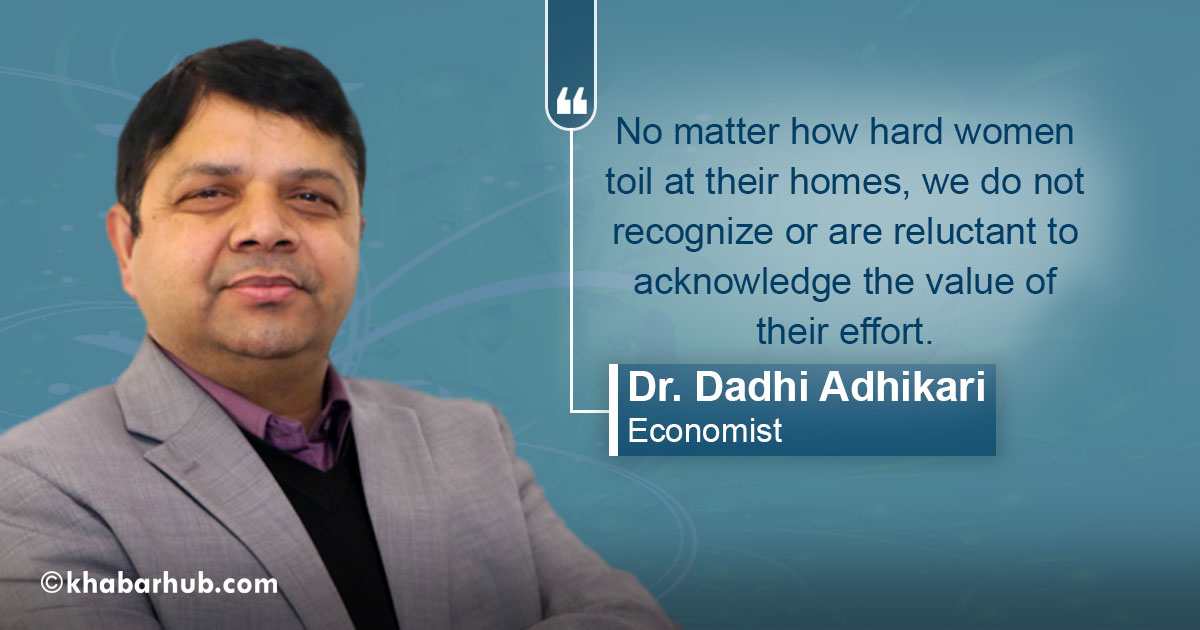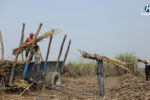There has been an ingrained, or say, stereotypical notion in the Nepali society that women should pitch in more when it comes to household chores. In point of fact, women consistently perform household chores while males are accustomed to gulping down foods served by them.
Women have been relentlessly doing this for ages, without any complaints. We take it for granted that it is natural for women to carry out such domestic chores.
No matter how hard women toil at their homes from dawn to dusk, we do not recognize or are reluctant to acknowledge the value of their effort. A study shows that the unpaid work carried out by women accounts for about 13 percent of the global GDP. In neighboring India, women’s unpaid work contributes to 40 percent of its GDP. Nepal is no different from India when it comes to women’s unpaid work.
The aim of SNA is to make GDP calculation process consistent around the world. There have been several attempts to include unpaid household work performed by women in the SNA production boundary.
Fundamental guidelines about including goods in a country’s GDP is provided by a publication called System of National Accounts (SNA) published jointly by the European Commission (EC), International Monetary Fund (IMF), Organization for Economic Co-operation and Development (OECD), UN and the World Bank.
The aim of SNA is to make GDP calculation process consistent around the world. There have been several attempts to include unpaid household work performed by women in the SNA production boundary.
Production boundary is a concept used in SNA to distinguish economic and non-economic activities. The activities which fall inside the production boundary are economic activities. There are three official versions of SNA – 1965, 1993 and 2008, all of which have failed to incorporate unpaid work in the production boundary. Although the first two versions of the SNA did not include unpaid work in the production boundary, they did not exclude them either. They were silent about it. But the SNA-2008 formally excluded the unpaid work. In page number 98, the SNA 2008 states:
“The production of services by members of the household for their own final consumption has traditionally been excluded from measured production in national accounts and it is worth explaining briefly why this is so. It is useful to begin by listing those services for which no entries are recorded in the accounts when they are produced by household members and consumed within the same household:
- The cleaning, decoration, and maintenance of the dwelling occupied by the household, including small repairs of a kind usually carried out by tenants as well as owners;
- The cleaning, servicing, and repair of household durables or other goods, including vehicles used for household purposes;
- The preparation and serving of meals;
- The care works of sick, infirm and elderly as well as training and instruction of children;
- The transportation of members of the household or their goods.”
The reason for not including the unpaid job in the production boundary, according to SNA (page 99), are difficulties in estimating the value of such work and adverse impact on the usefulness of the accounts for policy purposes. However, these two reasons are very weak to convince towards not including the unpaid job in the production boundary.
Exclusion of unpaid job from the national account has both economic, social and political implications. This exclusion is one of the greatest barriers towards women empowerment.
On the one hand, there are several areas in development and economics where we use non-market valuation technique to value non-market good for the policy purpose. EXON-Valdez oil spill is perhaps the most suitable example in this context. Meanwhile, it is not difficult to break the total GDP of different components. As per the current practice, we are already decomposing total GDP into agriculture, industry, and service. So, it should not be a big deal to create another category of the unpaid job as a GDP component.
Exclusion of unpaid job from the national account has both economic, social and political implications. This exclusion is one of the greatest barriers towards women empowerment. Recognition of women’s work either paid or unpaid is the first step towards their empowerment.
The impact of constrained empowerment of women in developing countries manifests in many forms such as their restricted participation in public life and lack of access to higher education and formal economy. Second, such exclusion falsely depicts low GDP of many developing countries. That is to say, that though production of goods and services are at a satisfactory level they are not revealed in the national account. This means the GDP in such a society is not real and is attenuated.
In the present global context where SNA has failed to recognize women’s unpaid job, incorporating their contribution to the GDP formally may take some time. However, Nepal can take the initiation in acknowledging women’s work through time use survey. A time use survey reports data on how people spend their time. Once we have this survey then we can, at least, estimate how much time do Nepalese women spend on household works. Later, this can be valued in terms of money. The Central Bureau of Statistics needs to work out to this end.
Views expressed in this article are the author’s own and do not necessarily reflect the stance of Khabarhub.









Comment